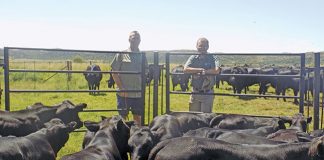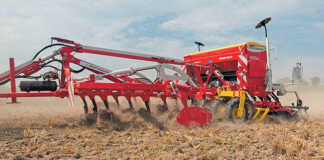
Photo: South African Tourism
In family farming concerns, succession planning is seldom part of a business strategy. Yet it is crucial to ensuring a smooth transition from generation to generation, and the ultimate sustainability of the operation. So says André Diederichs, CEO of the Family Business Association of South Africa.
Diederichs stresses that a succession plan should be drawn up in good time to ensure continuity, should the current owner/manager retire or find it difficult to run the business.
He warns against the misconception that the firstborn child, or the firstborn son in particular, should automatically take over the reins, as he or she may not necessarily be the best choice to lead the business.
READ A new era for livestock auctions: Going, going, gone online!
The main objective of a family-run business is to create wealth for the family; it thus makes sense to choose a successor that clearly has the capability to do this. It might even be wise to appoint a successor (or CEO) from outside the family should family members be unable or unwilling to take over.
The successor has to remain accountable to the family at all times. Moreover, he or she should be exposed to the company’s decision-making process from early on to learn the ropes while still under the guardianship of the current management.
“Parents can no longer afford to keep their last will and testament a secret. All family members should be fully informed about what the future holds to ensure a smooth transition from one generation to the next. If family businesses fail to plan for succession, they plan to fail,” warns Diederichs.
Safeguarding the business
Sound governance structures are no less important, he emphasises. “It’s important to safeguard the business against the emotions of the family. The family business’s constitution determines the long-term vision, values, family and business objectives, as well as the rules for succession,” says Diederichs.
Ahmed Badrodin, a senior legal adviser at FNB, says the proverb ‘from shirtsleeves to shirtsleeves in three generations’ describes the common three-generation cycle of failure of a family business.
As families and family businesses develop and grow from one generation to the next, relationships often become more complex, more difficult and in some cases, more fragmented.
READ Coping strategies to deal with uncertainty
“Those who manage family businesses should consider the advantages of having a family constitution to help plan for and manage the operation of their business and deal with complex or unexpected situations,” he says.
A family constitution is a formal document that sets out the rights, values, responsibilities and rules that apply to stakeholders in the company, and provides plans and structures to deal with situations that could arise during the course of business.
These include employment and remuneration of family members, as well as appointment of family members to the board of directors, appointment of the CEO, and the division of assets between family members.
The constitution should also cover succession plans and policies, the process of retirement, and the disclosure and exchange of information between family members, whether they are employed or not by the business.
Without a proper family governance framework, sudden events such as death, severe illness or injury, divorce, or substantial third-party claims against the business could paralyse the operation.
“Management or legal structures could unravel and cause uncertainty amongst family members and others who have a stake in the business. A family constitution will enable the business to withstand the effect of these sudden events,” says Badrodin.
Businesses may often question the need for a family constitution if they have a legally binding shareholders’ agreement or memorandum of incorporation.
However, a family constitution is complementary to these documents, as these documents do not typically take into account family dynamics or the relationship between the family and the business.
Badrodin adds that although a family constitution can be introduced at any stage, “it’s advisable to do so as early as possible, when decisions can be made objectively, and not wait until a critical juncture to try to solve decisions and matters that could have a material, adverse effect on the operation.”
Separation of duties
The Boetie Viljoen family concern, with its headquarters in Leeudoringstad in North West, comprises Hansie Viljoen (CEO), his father Boetie, and Hansie’s three sons, Kobus, Dihan and Henrikus. Each shareholder is responsible for a separate branch of the business.
Viljoen stresses the need for communication.
“We meet regularly to share ideas and discuss matters of interest. It’s important in our business that each shareholder is able to function independently. Decision-making ultimately remains with the person responsible for the specific branch he is in charge of,” he says.
READ Ensuring food safety in a family-run cheesery
Viljoen’s sons initially worked in the company for a year or two to determine which part of the business they were most interested in. From then on, they were incorporated as partners, but with each working towards his own estate.
The Viljoens’ business plan makes it possible for each member of the family to start his own business under the auspices of the mother company.
Viljoen says it is unfair not to allow new entrants into a family business to become partners as soon as possible. He advises that each shareholder be afforded the opportunity to build up his or her own assets. Although it is important for the shareholders to adapt to the concern’s ultimate mission and vision, opportunities must be created for them to pursue new avenues, as long as the business itself is not put at risk in any way.
“These family members also have dreams and expectations for the future. The business needs to make it possible for them to realise their dreams. The new entrant, on the other hand, must realise that he/she is part of a business, and therefore needs to adhere to its strategy. Nothing must be done to put the company’s economies of scale in danger,” he says.
Unlocking potential
Japie Grobler, who farms with his son, Phillip, in the Bothaville district of the Free State, says he made Phillip wait for two years after qualifying as an engineer before allowing him to join the family farm.
He says that with the economic realities of the industry, anybody who wants to farm must fully understand the challenges involved and be strongly convinced that this is the right career for him/her.
Phillip initially worked as a salaried member of the business, but is in the process of becoming a full shareholder. The rest of the Grobler children, who are all involved in farming, form part of a separate estate incorporated in a joint trust.
READ Want to work in the agri sector? Take note of these in-demand skills
“It’s important that children be given the opportunity to broaden their horizons. Although the rest of my children form part of the concern, I remain involved in their respective businesses. It’s my responsibility as a parent to allow them opportunities to unlock their potential,” says Grobler.
The family meets formally twice a year, and the meeting is organised and chaired by the children rotationally. According to Grobler, it is essential to maintain family ties, keep organisational structures as straightforward as possible, and work actively towards developing each role player’s strong points. Mutual respect is key to any successful business, he emphasises.
Phone André Diederichs on 082 453 32 88, Japie Grobler on 018 441 1104, or Hansie Viljoen on 082 807 0185. Email Ahmed Badrodin at [email protected].












